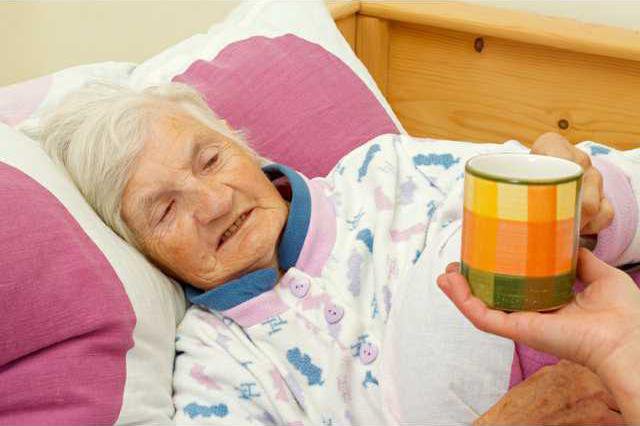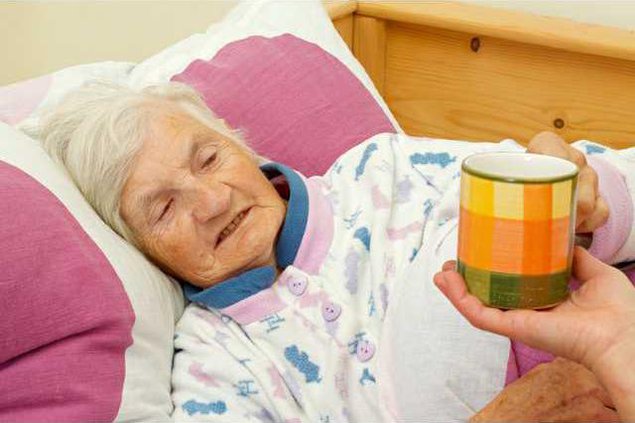Grandma is dying.
For the last five years, most of the family has known of her losing bout with cancer, and every few months there's been a new scare or flare up or worry. But recently she took a more serious turn for the worse, and there's no telling just how much longer she will be with us. That's cancer's special brand of struggle; she could last another year theoretically, or she could be gone in two weeks.
The transformation that has taken hold of her home is tangible. Everything feels terribly fragile. The hushed voices, reverently filing in one at a time to see her, the heavy and serious conversations, all feel so foreign when compared to the loud and happy woman she has been all her life.
For the first time, I know what it feels like to have a loved one begin packing her things to head home. I realize that though there is little that can be done about what is soon coming, there is much that can be done in the meantime for siblings, children, grandchildren and grandma herself to make the transition easier on everyone.
Keep these five things in mind to make the best of the worst time in a family:
1. Don't forget who is most important
Take care that the person heading home remains the center of your concern. Yes, it is crucially important to take every chance to spend more time together, but there will be good days and there will be bad days. Sometimes grandma will feel all right to get up and move around a bit, and sometimes all she can muster is staying in bed. Don't let your anxiety to be with them become more important than their need.
2. Make a special effort to do what they like
This will come naturally to most people. Play their favorite song on the piano; if they like books, read to them. Find their most-loved treat. No matter how small or great the request, you will find that these things will become sweet memories to cherish.
3. Keep the humor alive
Although this is a time for seriousness and of course much sadness, a little humor will do wonders to break that heavy load, especially coming from the one heading home. Grandma wanted to tell us in our latest visit that we ought to let government workers know they talk too much. Everyone in the room was wheezing with laughs. Laughter always has been the best medicine.
4. Practice patience, be forgiving
There will be situations that can easily lead to offense and hurt feelings among family members; everyone wants to see grandma now, everyone wants to help, and frankly there is no way to meet all these desires.
However well-intentioned, siblings can cause friction, some grandchildren might feel left out, and all this to say nothing of the burden of planning a funeral.
Remember that your entire family is there in the same boat with you. Anger will cause far greater damage at this time of high emotion than at any other; using patience and forgiveness now will be more important than ever.
5. Spend time squaring with their departure before it comes
What we all know, but try to avoid, is that eventually the time will come for grandma to actually make the trip. There will be no more time for family time, and she'll leave us behind. I've never tasted a more unpleasant thought than this, but its inevitability makes it so important to make peace with.
Spend significant time with your family preparing for it. Take time on your own to think it over, several times, if need be. Write down your thoughts, work diligently until you can arrive at the place where you can say it will be all right. Doing this before the day comes will minimize the emotional hurt, and enable you to comfort others.
When grandma took this recent turn, we heard the details from my dad, tears in his eyes, explaining how very close his mother was to the end. As he spoke, I thought of the day when she would pass, and though I knew the pain at the loss would be raw and sore for a while, I began to see as well that it would truly, honestly, be all right.
Her life is a beautiful thing, and she has lived it masterfully. She wrote a book in recent years for all of her family to have and remember, and the quiet moments I have had with her I will never forget. Instead of hating that she will be gone, I try to be excited for what is coming next for her. Instead of being sad now, I relish what time there is left with her, and try to implement in myself the same kind of love and wisdom she understands.
Grandma is dying, but I know it will truly, honestly, be all right.
For the last five years, most of the family has known of her losing bout with cancer, and every few months there's been a new scare or flare up or worry. But recently she took a more serious turn for the worse, and there's no telling just how much longer she will be with us. That's cancer's special brand of struggle; she could last another year theoretically, or she could be gone in two weeks.
The transformation that has taken hold of her home is tangible. Everything feels terribly fragile. The hushed voices, reverently filing in one at a time to see her, the heavy and serious conversations, all feel so foreign when compared to the loud and happy woman she has been all her life.
For the first time, I know what it feels like to have a loved one begin packing her things to head home. I realize that though there is little that can be done about what is soon coming, there is much that can be done in the meantime for siblings, children, grandchildren and grandma herself to make the transition easier on everyone.
Keep these five things in mind to make the best of the worst time in a family:
1. Don't forget who is most important
Take care that the person heading home remains the center of your concern. Yes, it is crucially important to take every chance to spend more time together, but there will be good days and there will be bad days. Sometimes grandma will feel all right to get up and move around a bit, and sometimes all she can muster is staying in bed. Don't let your anxiety to be with them become more important than their need.
2. Make a special effort to do what they like
This will come naturally to most people. Play their favorite song on the piano; if they like books, read to them. Find their most-loved treat. No matter how small or great the request, you will find that these things will become sweet memories to cherish.
3. Keep the humor alive
Although this is a time for seriousness and of course much sadness, a little humor will do wonders to break that heavy load, especially coming from the one heading home. Grandma wanted to tell us in our latest visit that we ought to let government workers know they talk too much. Everyone in the room was wheezing with laughs. Laughter always has been the best medicine.
4. Practice patience, be forgiving
There will be situations that can easily lead to offense and hurt feelings among family members; everyone wants to see grandma now, everyone wants to help, and frankly there is no way to meet all these desires.
However well-intentioned, siblings can cause friction, some grandchildren might feel left out, and all this to say nothing of the burden of planning a funeral.
Remember that your entire family is there in the same boat with you. Anger will cause far greater damage at this time of high emotion than at any other; using patience and forgiveness now will be more important than ever.
5. Spend time squaring with their departure before it comes
What we all know, but try to avoid, is that eventually the time will come for grandma to actually make the trip. There will be no more time for family time, and she'll leave us behind. I've never tasted a more unpleasant thought than this, but its inevitability makes it so important to make peace with.
Spend significant time with your family preparing for it. Take time on your own to think it over, several times, if need be. Write down your thoughts, work diligently until you can arrive at the place where you can say it will be all right. Doing this before the day comes will minimize the emotional hurt, and enable you to comfort others.
When grandma took this recent turn, we heard the details from my dad, tears in his eyes, explaining how very close his mother was to the end. As he spoke, I thought of the day when she would pass, and though I knew the pain at the loss would be raw and sore for a while, I began to see as well that it would truly, honestly, be all right.
Her life is a beautiful thing, and she has lived it masterfully. She wrote a book in recent years for all of her family to have and remember, and the quiet moments I have had with her I will never forget. Instead of hating that she will be gone, I try to be excited for what is coming next for her. Instead of being sad now, I relish what time there is left with her, and try to implement in myself the same kind of love and wisdom she understands.
Grandma is dying, but I know it will truly, honestly, be all right.








